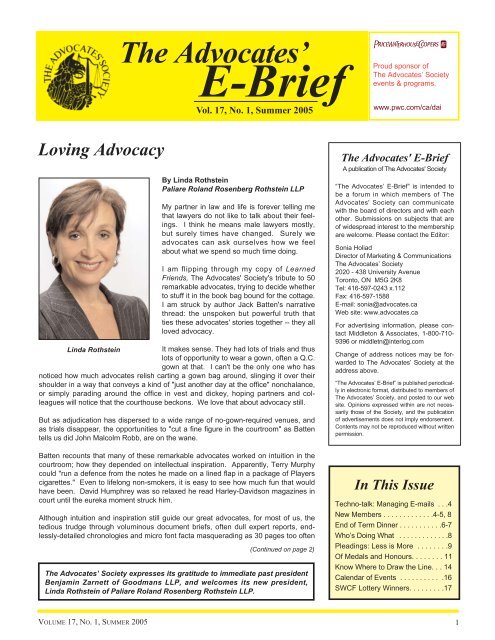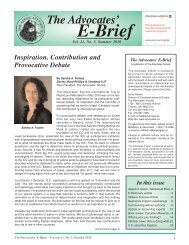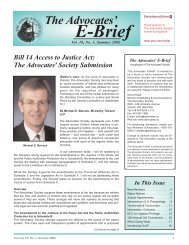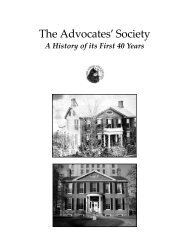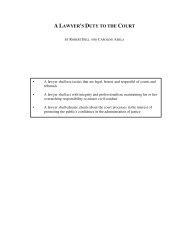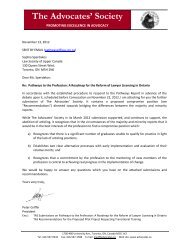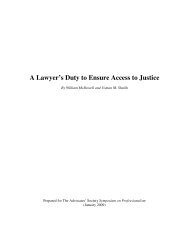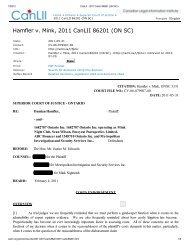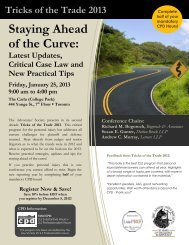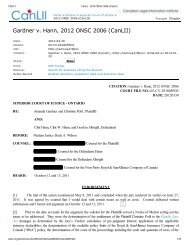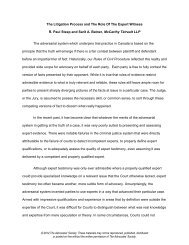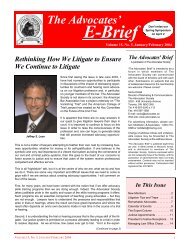E-Brief Sept - Oct - The Advocates' Society
E-Brief Sept - Oct - The Advocates' Society
E-Brief Sept - Oct - The Advocates' Society
You also want an ePaper? Increase the reach of your titles
YUMPU automatically turns print PDFs into web optimized ePapers that Google loves.
<strong>The</strong> Advocates’<br />
E-<strong>Brief</strong><br />
Vol. 17, No. 1, Summer 2005<br />
<br />
Proud sponsor of<br />
<strong>The</strong> Advocates’ <strong>Society</strong><br />
events & programs.<br />
www.pwc.com/ca/dai<br />
Loving Advocacy<br />
By Linda Rothstein<br />
Paliare Roland Rosenberg Rothstein LLP<br />
My partner in law and life is forever telling me<br />
that lawyers do not like to talk about their feelings.<br />
I think he means male lawyers mostly,<br />
but surely times have changed. Surely we<br />
advocates can ask ourselves how we feel<br />
about what we spend so much time doing.<br />
I am flipping through my copy of Learned<br />
Friends, <strong>The</strong> <strong>Advocates'</strong> <strong>Society</strong>'s tribute to 50<br />
remarkable advocates, trying to decide whether<br />
to stuff it in the book bag bound for the cottage.<br />
I am struck by author Jack Batten's narrative<br />
thread: the unspoken but powerful truth that<br />
ties these advocates' stories together -- they all<br />
loved advocacy.<br />
Linda Rothstein<br />
It makes sense. <strong>The</strong>y had lots of trials and thus<br />
lots of opportunity to wear a gown, often a Q.C.<br />
gown at that. I can't be the only one who has<br />
noticed how much advocates relish carting a gown bag around, slinging it over their<br />
shoulder in a way that conveys a kind of "just another day at the office" nonchalance,<br />
or simply parading around the office in vest and dickey, hoping partners and colleagues<br />
will notice that the courthouse beckons. We love that about advocacy still.<br />
But as adjudication has dispersed to a wide range of no-gown-required venues, and<br />
as trials disappear, the opportunities to "cut a fine figure in the courtroom" as Batten<br />
tells us did John Malcolm Robb, are on the wane.<br />
Batten recounts that many of these remarkable advocates worked on intuition in the<br />
courtroom; how they depended on intellectual inspiration. Apparently, Terry Murphy<br />
could "run a defence from the notes he made on a lined flap in a package of Players<br />
cigarettes." Even to lifelong non-smokers, it is easy to see how much fun that would<br />
have been. David Humphrey was so relaxed he read Harley-Davidson magazines in<br />
court until the eureka moment struck him.<br />
Although intuition and inspiration still guide our great advocates, for most of us, the<br />
tedious trudge through voluminous document briefs, often dull expert reports, endlessly-detailed<br />
chronologies and micro font facta masquerading as 30 pages too often<br />
(Continued on page 2)<br />
<strong>The</strong> Advocates’ <strong>Society</strong> expresses its gratitude to immediate past president<br />
Benjamin Zarnett of Goodmans LLP, and welcomes its new president,<br />
Linda Rothstein of Paliare Roland Rosenberg Rothstein LLP.<br />
<strong>The</strong> <strong>Advocates'</strong> E-<strong>Brief</strong><br />
A publication of <strong>The</strong> <strong>Advocates'</strong> <strong>Society</strong><br />
“<strong>The</strong> Advocates’ E-<strong>Brief</strong>” is intended to<br />
be a forum in which members of <strong>The</strong><br />
<strong>Advocates'</strong> <strong>Society</strong> can communicate<br />
with the board of directors and with each<br />
other. Submissions on subjects that are<br />
of widespread interest to the membership<br />
are welcome. Please contact the Editor:<br />
Sonia Holiad<br />
Director of Marketing & Communications<br />
<strong>The</strong> Advocates’ <strong>Society</strong><br />
2020 - 438 University Avenue<br />
Toronto, ON M5G 2K8<br />
Tel: 416-597-0243 x.112<br />
Fax: 416-597-1588<br />
E-mail: sonia@advocates.ca<br />
Web site: www.advocates.ca<br />
For advertising information, please contact<br />
Middleton & Associates, 1-800-710-<br />
9396 or middletn@interlog.com<br />
Change of address notices may be forwarded<br />
to <strong>The</strong> Advocates’ <strong>Society</strong> at the<br />
address above.<br />
“<strong>The</strong> Advocates’ E-<strong>Brief</strong>” is published periodically<br />
in electronic format, distributed to members of<br />
<strong>The</strong> Advocates’ <strong>Society</strong>, and posted to our web<br />
site. Opinions expressed within are not necessarily<br />
those of the <strong>Society</strong>, and the publication<br />
of advertisements does not imply endorsement.<br />
Contents may not be reproduced without written<br />
permission.<br />
In This Issue<br />
Techno-talk: Managing E-mails . . .4<br />
New Members . . . . . . . . . . . . .4-5, 8<br />
End of Term Dinner . . . . . . . . . . .6-7<br />
Who’s Doing What . . . . . . . . . . . . .8<br />
Pleadings: Less is More . . . . . . . .9<br />
Of Medals and Honours. . . . . . . . 11<br />
Know Where to Draw the Line. . . 14<br />
Calendar of Events . . . . . . . . . . .16<br />
SWCF Lottery Winners. . . . . . . . .17<br />
VOLUME 17, NO. 1, SUMMER 2005<br />
1
(Continued from page 1)<br />
kicks the pure creativity out of our most persuasive efforts. We strive for studied, well-crafted, thorough and precise, and consider<br />
those accolades.<br />
Batten continues. <strong>The</strong>re were the great scholars of the law: the advocates who loved the work of sculpting a Byzantine area of<br />
jurisprudence into a great modernist expression of pure line and logic. Say, Ian Scott arguing for an individual's right to be heard in<br />
administrative proceedings, or Bud Estey developing the law of copyrighted music.<br />
I know our colleagues in the criminal bar still argue law in every case, still find lots of opportunity to move the law, to reform it, no<br />
doubt to create it. But for most civil litigation working stiffs, we must be satisfied with the opportunity to give the law a tweak here<br />
and there, before telling our clients that the costs of an appeal outweigh the likelihood of success.<br />
Which begs the question I was asked by two young advocates at the end of one of the <strong>Society</strong>'s mentoring dinners. "You're so<br />
enthusiastic," they said. "Do you really love advocacy? What's to love?"<br />
I do love advocacy. Not all the time, of course, and not very much during the murky child-rearing years during which almost everything<br />
felt like a burden or a failure, and home life and work life were mostly warring partners. And I doubt that I love advocacy as<br />
much as some of my predecessors (past presidents of <strong>The</strong> <strong>Advocates'</strong> <strong>Society</strong>) who never seemed to tire of it or long for a beach<br />
vacation or a sabbatical in Tuscany. It's not all-consuming, the way I imagine it was for the greats of the past.<br />
Of course winning is as seductive as ever, whatever the win. Lucrative or modest, just or unjust, few advocates can resist a victory<br />
lap or clenched fist or gleeful yelp. I suspect our ranks are filled with highly competitive closet athletes who mostly love the game of<br />
litigation and who secretly (or not so secretly) keep tally of their batting average along with their month-end billable hours.<br />
<strong>The</strong> exhilaration of the daring and damning cross-examination is obviously addictive, but, more mythical than real. Instead, whether<br />
I look backward or forward, I'm inspired by advocacy's little victories: the examination-in-chief that unfolds with the panic-stricken<br />
witness actually talking to the judge in sensible sentences and paragraphs, thanks to questions that gently nudge the story forward<br />
to its compelling conclusion; the expert witnesses -- many of them disappointing, some of them the most interesting people I've<br />
(Continued on page 3)<br />
Need credible expert testimony?<br />
You want us on your team.*<br />
As experienced professionals in investigative and forensic accounting,<br />
business valuations, computer forensics, litigation support and<br />
insurance claims, we objectively analyze complex financial matters and<br />
testify to our findings in court. A truly global organization with member<br />
firms in 139 countries, we invite you to connect with our partners to<br />
discuss your unique issues.<br />
Jim Forbes 905 972 4105<br />
Ken Goodwin 416 814 5760<br />
Steve Henderson 416 941 8328<br />
Ron Jackson 613 755 4343<br />
Kristian Knibutat 416 815 5083<br />
Helen Mallovy Hicks 416 814 5739<br />
Wesley Mark 416 814 5877<br />
Bob Martin<br />
John Seigel<br />
Kas Rehman<br />
Peter Vakof<br />
416 941 8306<br />
416 815 5087<br />
613 755 4328<br />
416 814 5841<br />
Bruce Webster 416 815 5250<br />
Bruce Webster 519 640 8009<br />
*connectedthinking<br />
<br />
© 2005 PricewaterhouseCoopers LLP, Canada. “PricewaterhouseCoopers” refers to PricewaterhouseCoopers LLP, Canada, an Ontario limited liability<br />
partnership, or, as the context requires, the network of member firms of PricewaterhouseCoopers International Limited, each of which is a separate<br />
and independent legal entity. *connectedthinking is a trademark of PricewaterhouseCoopers LLP.<br />
2<br />
VOLUME 17, NO. 1, SUMMER 2005
<strong>The</strong> <strong>Advocates'</strong> <strong>Society</strong><br />
2005 - 2006<br />
EXECUTIVE<br />
Linda Rothstein, LSM, President<br />
Michael E. Barrack,<br />
First Vice-president<br />
Michael Eizenga,<br />
Second Vice-president<br />
Peter J.E. Cronyn, Treasurer<br />
Sandra A. Forbes, Secretary<br />
DIRECTORS<br />
Raj Anand, LSM<br />
Stephen Bale<br />
Robert Bell<br />
Jack Braithwaite<br />
David M. Brown<br />
Fay K. Brunning<br />
Clare E. Burns<br />
John E. Callaghan<br />
Domenic A. Crolla<br />
William D. Dunlop<br />
Stephen E. Firestone<br />
Paul J. French<br />
Peter H. Griffin<br />
Barbara Grossman<br />
Marie T. Henein<br />
Jessica A. Kimmel<br />
Alfred M. Kwinter<br />
Mark D. Lerner<br />
Shirley D. Linton<br />
Alan H. Mark<br />
Barbara A. McIsaac, Q.C.<br />
Wendy L. Miller<br />
Paul F. Monahan<br />
Kimberly T. Morris<br />
David S. Morritt<br />
Patrick J. Murphy<br />
Michael A. Penny<br />
Brian J. Saunders<br />
James Scarfone<br />
Paul B. Schabas<br />
Jonathan Stainsby<br />
Karen A. Thompson<br />
Bonnie A. Tough<br />
Margaret L. Waddell<br />
Peter C. Wardle<br />
Stephen J. Wojciechowski<br />
Johanna Braden, Ex Officio<br />
EXECUTIVE DIRECTOR<br />
Alexandra M. Chyczij<br />
DIRECTOR of EDUCATION<br />
Jessica Grant<br />
DIRECTOR of MARKETING and<br />
COMMUNICATIONS<br />
Sonia Holiad<br />
(Continued from page 2)<br />
ever met -- who patiently teach us more about science or technology or human psychology<br />
than we could learn in an undergraduate course; the reluctant witness who<br />
agrees our client was shafted and is prepared, subpoena in hand, to tell the tribunal<br />
so. Or there's the moment when you connect with the judge, the jury, or the panel,<br />
and your words, your logic, your voice, or who knows what miraculous combination,<br />
convince them of the justness of your client's cause.<br />
Yes, defeat is tough, sometimes crushing. Clients are frequently unlovable. But win,<br />
lose or settle, there is almost always this to love about advocacy: the endless wonder<br />
of walking a mile in someone else's shoes.<br />
By the way, I loved Learned Friends, as will you, but it doesn't qualify as a beach<br />
read. Grab something else that will carry you away in the hot August sun and enjoy<br />
the summer.<br />
Thank You and Best Wishes to our<br />
Outgoing Directors<br />
Kevin R. Aalto • Paul J.J. Cavalluzzo<br />
Elizabeth Cummins Seto • Brian A. Foster<br />
Julie K. Hannaford • George B. Kilpatrick<br />
Wendy Matheson • J. Patrick Moore<br />
Barbara J. Murchie • Allan Sternberg<br />
and<br />
Paul H. Le Vay, ex officio<br />
the Managing Editor of the Journal, who is stepping down after<br />
a decade of service.<br />
INTELLECTUAL PROPERTY<br />
Patents<br />
Trade-marks<br />
Trade Secrets<br />
Industrial Design<br />
Packaging & Labelling<br />
Litigation<br />
Licensing<br />
Copyright<br />
Product Liability<br />
Technology Transfer<br />
SIM, HUGHES, ASHTON & MCKAY LLP<br />
Barristers & Solicitors<br />
330 University Avenue<br />
6 th Floor<br />
Toronto, Ontario<br />
Canada M5G 1R7<br />
SIM & MCBURNEY<br />
Patent & Trade-mark Agents<br />
P. (416) 595-1155<br />
F. (416) 595-1163<br />
www.sim-hughes.com www.sim-mcburney.com<br />
mailsim@sim-hughes.com mailsim@sim-mcburney.com<br />
VOLUME 17, NO. 1, SUMMER 2005<br />
3
Welcome to Our<br />
New Members<br />
Associate<br />
Stephen Pitel,<br />
University of Western Ontario<br />
Government<br />
Alexandra K. Brown,<br />
Department of Justice<br />
Mary C. O'Donoghue<br />
Information & Privacy Commissioner<br />
Intermediate<br />
Afshan Ali, Torys LLP<br />
Lisa C. Alleyne, Lerners LLP<br />
Kyle Armagon, Walker, Head<br />
Oneal Banerjee,<br />
Borden Ladner Gervais LLP<br />
Matthew Biderman,<br />
Borden Ladner Gervais LLP<br />
Howard R. Blitstein,<br />
Howie, Sacks & Henry LLP<br />
Melanie L. Breen,<br />
Regan Desjardins LLP<br />
Patrizia I. Bruzio, Aird & Berlis<br />
Raquel Chisholm,<br />
Emond, Harnden LLP<br />
Barnali Choudhury, Wardle Daley LLP<br />
Mark E. Davis, Heenan Blaikie LLP<br />
Rinku Deswal, Bersenas Jacobsen<br />
Chouest Thomson Blackburn LLP<br />
Bindu Dhaliwal,<br />
Gowling Lafleur Henderson LLP<br />
Katherine Di Tomaso,<br />
Cassels Brock & Blackwell LLP<br />
Kammy Digambar, McCague,<br />
Peacock, Borlack, McInnis & Lloyd LLP<br />
Brad Elberg, Heenan Blaikie LLP<br />
Jennifer Fairfax,<br />
Osler, Hoskin & Harcourt LLP<br />
Madeline R. Ferreira,<br />
Shibley, Righton LLP<br />
Michael Foulds, McCague, Peacock,<br />
Borlack, McInnis & Lloyd LLP<br />
Stephanie Fraser, Aird & Berlis<br />
Sal Guzzo, Fireman Barristers LLP<br />
<strong>The</strong>resa M. Hartley, McCague,<br />
Peacock, Borlack, McInnis & Lloyd LLP<br />
Lisa Holland, Sokoloff and Associates<br />
William J. Jesseau,<br />
Lawson McGrenere LLP<br />
Charlotte Kanya-Forstner,<br />
Blake, Cassels & Graydon LLP<br />
Melissa Kehrer, Beard, Winter LLP<br />
Kerri Knudsen, Adair Morse LLP<br />
Continued on page 5...<br />
TECHNO-TALK: Send Fewer E-mails,<br />
and Help Save World Productivity<br />
By Dan Pinnington,<br />
Director, practicePRO, LAWPRO<br />
E-mail is an essential tool for clients, lawyers and<br />
law office staff alike. It allows easy and virtually<br />
instant exchanges of information and, for many,<br />
has become a preferred way of communicating. In<br />
North America alone, tens of billions of e-mail messages<br />
are sent every day. That's not a typo - read<br />
“b” for billions. All those messages end up in e-mail<br />
inboxes, including yours and mine. As a result, we<br />
all are trying desperately to cope with the amount<br />
of e-mail we are receiving. If it gets much worse,<br />
the Internet may grind to a halt.<br />
Time to think globally and act locally<br />
Dan Pinnington<br />
If every member of <strong>The</strong> <strong>Advocates'</strong> <strong>Society</strong> sent<br />
one less message each business day, that would be almost one million fewer e-<br />
mails over the next year. Amazing! We all have a tendency to send and reply to e-<br />
mail messages when it is not absolutely necessary. E-mails are just so darn easy to<br />
create and send. It’s time to put some thought into what has become an almost<br />
thoughtless task.<br />
Stop Loading Up Those Address Lines<br />
Lets start with the “To:” line. Don't just slam a bunch of names in there. Ask yourself<br />
who really needs to get the message. Include those names, and leave the rest out.<br />
Next up: the carbon copy or "CC" line. It is intended to be helpful, but can actually be<br />
quite dangerous. We all start with good intentions and start adding names, sometimes<br />
for reasons that are somewhat unrelated to the actual message. Gotta show<br />
the senior partner I’m working on her file. Gotta show the boss I'm working on a<br />
Saturday. Resist the temptation! If they aren't on the “To:” line already, it probably<br />
means something. Ask yourself who really needs to be CC'd on this message.<br />
Include those names, and leave the rest out.<br />
<strong>The</strong> next target: "Reply-to-all." It does make it dead easy to reply to everyone that<br />
got the original message, but don't use reply-to-all just because you can. Ask yourself<br />
if everyone that got this message in the first place really needs to see a reply<br />
from you. Odds are, the answer is probably not; and, if you were only CC'd on the<br />
original message, I would suggest the answer is most likely not.<br />
Consider a message with a meeting invitation that asks for an RSVP. Is it really necessary<br />
to let everyone know that you can or can't make it? In many cases, it will be<br />
just fine to reply only to the person who sent the invitation.<br />
Don't Abuse Your Address Groups<br />
Distribution lists or e-mail address groups are potentially the most evil. <strong>The</strong>y make it<br />
a simple and mindless task to send e-mail messages to tens, hundreds or even<br />
thousands of people. I can't argue with the fact that from an efficiency point of view it<br />
makes sense to put people you frequently e-mail in a group under one address. You<br />
just need to use distribution lists with a bit of care and discretion.<br />
<strong>The</strong> “All Users,” “Everyone” and other global address groups built into many e-mail<br />
systems are pretty much Armageddon. Anything that permits any single employee<br />
to interrupt every other person in the firm should be illegal; indeed, many firms limit<br />
access to the global address groups, and some kill them outright. No doubt, in a few<br />
(Continued on page 5)<br />
4 VOLUME 17, NO. 1, SUMMER 2005
(Continued from page 4)<br />
Daniella Kozovski,<br />
Ontario Securities Commission<br />
Michael Krylov, Krylov & Company<br />
Jeffrey Larry, Paliare Roland<br />
Rosenberg Rothstein LLP<br />
Dawne Latta, Eryou Barristers<br />
James V. Leone, Beard, Winter LLP<br />
Madeleine Loewenberg,<br />
Sherrard Kuzz LLP<br />
Jennifer Lee Marston,<br />
Blake, Cassels & Graydon LLP<br />
Derek McBean, Goodmans LLP<br />
Sarah McCoubrey,<br />
Shibley, Righton LLP<br />
Laura McLaughlin, Woolgar<br />
VanWiechen Ketcheson Ducoffe LLP<br />
Stephen Mullings, Dutton Brock LLP<br />
Johanna Myers, Fogler, Rubinoff LLP<br />
Bruce O'Toole,<br />
Blake, Cassels & Graydon LLP<br />
Kecia Podetz, Emond, Harnden LLP<br />
Natalie Shykula-Clarke,<br />
Levinter & Levinter<br />
Sorelle Simmons, Goodmans LLP<br />
Charles A. Toth,<br />
Fasken Martineau DuMoulin LLP<br />
Continued on page 8...<br />
circumstances it is necessary and appropriate to let everyone know about something<br />
-- like the fact that the building is burning down. Sorry, but the bookkeeper's<br />
uncle's 1982 Jetta for sale for $750 doesn't cut it. Put it on the lunchroom bulletin<br />
board, or your firm intranet, if you have one.<br />
Forgo the Forwarding Follies<br />
Don't forward virus warnings! We all have received these. <strong>The</strong>y warn of a malicious<br />
and destructive virus and ask that you help spread the word by warning all<br />
your friends. Despite the fact they often look official and purport to come from an<br />
official source, 99.99% of them are hoaxes. You are simply wasting your time, and<br />
the time of the people to whom you are forwarding the warning. Go to www.symantec.com/avcenter/hoax.html<br />
or a similar site to verify a virus warning.<br />
Don't forward jokes, SPAM or chain-mail messages. <strong>The</strong>y waste not only the recipient's<br />
time, but also valuable network and Internet capacity.<br />
Try Picking Up the Phone<br />
Lastly, don't use e-mail when it is inappropriate. E-mail is not the same as a phone<br />
call or a face-to-face conversation. At the top of the hierarchy of communications<br />
are face-to-face meetings, then phone calls, then voice mail, and lastly e-mail.<br />
Face-to-face meetings have the most impact; not only can you hear and respond to<br />
the other person, but you also have the ability to see gestures and facial expressions.<br />
On the phone you don't see gestures, but you can hear the tone and emotion<br />
in the speaker's voice. E-mail has the narrowest communications bandwidth --<br />
it is only words on a screen. Make sure the mode of communication you use fits<br />
the circumstance. Pick up the phone or walk down the hall when a more-personal<br />
style of contact is called for.<br />
VOLUME 17, NO. 1, SUMMER 2005<br />
5
<strong>The</strong> <strong>Society</strong> Celebrates with Guests at End of Term Dinner<br />
Some 1,030 members and special guests gathered at the Fairmont Royal York Hotel on June 22 for <strong>The</strong> Advocates’ <strong>Society</strong> End<br />
of Term Dinner, a formal event that has become a highly anticipated annual opportunity for collegiality amongst advocates and the<br />
judiciary. Members paid tribute to outgoing president Benjamin Zarnett of Goodmans LLP, and welcomed new president Linda<br />
Rothstein of Paliare Roland Rosenberg Rothstein LLP, who praised Mr. Zarnett for championing the issue of access to justice,<br />
and for being “the voice that everyone waits to hear, whether it’s around our boardroom table, in court, or at the head of our profession.”<br />
In Ben’s honour, <strong>The</strong> Advocates’ <strong>Society</strong>, together with his partners at Goodmans LLP, has established a bursary at<br />
Osgoode Hall Law School to be awarded to a student in financial need who has demonstrated an interest in advocacy through<br />
academic work or extra-curricular activities.<br />
Allan Rock, Ambassador and Permanent Representative of Canada to the United Nations, presented the keynote address, offering<br />
personal insights into his transition from the legal profession to the political arena, and outlining the challenges faced by the<br />
United Nations. Leading into Mr. Rock’s presentation was a 15-minute video spoof featuring the Ambassador and prominent<br />
members of the judiciary and the legal community. Written and produced by J. Thomas Curry of Lenczner Slaght Royce Smith<br />
Griffin LLP; Navin Khanna of Chitiz Pathak, and William McDowell of McCarthy Tétrault LLP, the video, now in its second year,<br />
was once again a highlight of the dinner.<br />
<strong>The</strong> Advocates’ <strong>Society</strong> Arleen Goss Young Advocates’ Award was presented to Vilko Zbogar of Klippenstein, Murray. Created in<br />
memory of <strong>Society</strong> member Arleen Goss, who passed away in 2002 at the age of 40, the award recognizes innovative and passionate<br />
advocacy, contribution to social justice, and commitment to the community.<br />
Joining Linda Rothstein on the 2005-06 Executive Committee are Michael E. Barrack of McCarthy Tétrault LLP (First Vice-president);<br />
Michael Eizenga of Siskind, Cromarty, Ivey & Dowler LLP (Second Vice-president); Peter J.E. Cronyn of Nelligan O’Brien<br />
Payne LLP (Treasurer), and Sandra A. Forbes of Davies Ward Phillips & Vineberg LLP (Secretary). A primary focus of Ms<br />
Rothstein’s presidency will be streamlining the civil justice system.<br />
Pictured above, seated left to right: <strong>The</strong> Hon. Allan Lutfy, Chief Justice of the Federal Court; Sandra A. Forbes of Davies Ward<br />
Phillips & Vineberg LLP; <strong>The</strong> Hon. Associate Chief Justice Annemarie E. Bonkalo of the Ontario Court of Justice; Deborah<br />
Hanscom, Barrister and Solicitor; Linda Rothstein of Paliare Roland Rosenberg Rothstein LLP; <strong>The</strong> Hon. Chief Justice Heather<br />
J. Smith of the Superior Court of Justice; <strong>The</strong> Hon. Associate Chief Justice Donald Ebbs of the Ontario Court of Justice; <strong>The</strong><br />
Hon. Regional Senior Justice J. Bryan Shaughnessy of the Superior Court of Justice, and <strong>The</strong> Hon. Regional Senior Justice<br />
John A. Payne of the Ontario Court of Justice. Standing, from left to right: Timothy D. Ray of Beament Green, who served as the<br />
piper; Allan Rock, Ambassador and Permanent Representative of Canada to the United Nations; Peter J.E. Cronyn of Nelligan<br />
O’Brien Payne LLP; Benjamin Zarnett of Goodmans LLP; George D. Hunter, Treasurer of the Law <strong>Society</strong> of Upper Canada;<br />
Michael E. Barrack of McCarthy Tétrault LLP; <strong>The</strong> Hon. R. Roy McMurtry, Chief Justice of Ontario; <strong>The</strong> Hon. Associate Chief<br />
Justice J. Douglas Cunningham of the Court of Appeal for Ontario; <strong>The</strong> Hon. Regional Senior Justice Warren K. Winkler of<br />
the Superior Court of Justice; Michael Eizenga of Siskind, Cromarty, Ivey & Dowler LLP, and Ian J. Roland of Paliare Roland<br />
Rosenberg Rothstein LLP.<br />
Photo: Eya Greenland<br />
6<br />
VOLUME 17, NO. 1, SUMMER 2005
Excerpts from Ben Zarnett’s End of Term Dinner Remarks<br />
... Four years ago I was invited to join the executive of <strong>The</strong> <strong>Advocates'</strong> <strong>Society</strong> by a then <strong>Advocates'</strong> <strong>Society</strong> big-wig who told me<br />
that if I accepted, and barring an unexpected outbreak of democracy, I would eventually become its president. "That's very kind," I<br />
said, summoning all of my reserves of modesty, "But there are so many others who are so much more qualified." "I know," he said.<br />
"But none of them are available."<br />
It is obvious that our new President is a very fast learner, but, even though I was not, I did learn a substantial amount while president<br />
over the last year ... I learned, more than I knew before, the important role <strong>The</strong> <strong>Advocates'</strong> <strong>Society</strong> can play in removing barriers<br />
to access to justice. I learned that from our work in interventions before the Courts and in government relations which led to<br />
Court decisions and, subsequently, to legislation providing for a fairly regulated contingent fee system, and for a system of waivers<br />
of court fees for those unable to afford them -- in both cases removing financial barriers to access to justice. I learned that from our<br />
work in making pro bono counsel available to certain unrepresented litigants in the Court of Appeal, the Divisional Court, the<br />
Federal Court of Appeal and to children, again providing access to justice to those who cannot afford it.<br />
I learned the meaningful role the <strong>Society</strong> can play in removing barriers to access to justice that are not financial, but systemic, such<br />
as the role we played in the development of reforms this year to the case management system in Toronto resulting in the Rule we<br />
call #78 in the rule book, but #1 in our hearts. I learned of the important role we can play in removing the barriers to access to justice<br />
that are physical, such as by the <strong>Society</strong>'s participation in the Chief Justices' Committee, which is reviewing steps that can be<br />
taken to make court services more accessible to persons with disabilities across the province.<br />
I learned more than I previously knew about the fact that "access" is only part of the "access to justice" equation, and that much<br />
depends as well on what happens when you get there. Here too the <strong>Society</strong> has such an important role to play through its education<br />
programs in ensuring the highest quality of advocacy in our courts. Our programs this year for the first time reached over 3,500<br />
participants and were offered in 12<br />
cities and taught advocacy skills on all<br />
levels, including the advanced level<br />
which allows you to confuse judges on<br />
a much higher plane. This year saw the<br />
introduction of a bursary program to Excellence in Advocacy with the ACTL<br />
help ensure that costs will not be a barrier<br />
to those programs.<br />
... And I learned, more than I knew<br />
before, about the need for our <strong>Society</strong><br />
to not retreat from, but in fact to reinforce<br />
certain barriers: these are the barriers<br />
that protect an independent judiciary<br />
and an independent bar, and I<br />
learned about the need to speak out as<br />
we did and will continue to in support<br />
and defence of those principles.<br />
"On behalf of <strong>The</strong> <strong>Advocates'</strong> <strong>Society</strong>."<br />
Over the past year, I began countless<br />
speeches and letters with these words.<br />
<strong>The</strong>y surround the otherwise modest<br />
and unexceptional thoughts of their<br />
speaker with the heft of an organization<br />
of over 3,000 advocates, and the depth<br />
of an organization with a 41-year record<br />
of accomplishments. I am grateful for<br />
the privilege of having been able to use<br />
them, and now that that particular ride<br />
is over, let me wish, on behalf of myself,<br />
to our new president, executive and<br />
board, a successful year and one in<br />
which they approach the important work<br />
of the <strong>Society</strong>, as I tried to approach<br />
this year, this evening and these<br />
remarks, with equal measures of gravity<br />
and levity.<br />
<strong>The</strong> American College of Trial Lawyers and <strong>The</strong> Advocates’ <strong>Society</strong> continued<br />
their tradition of presenting Spring Symposium, the premier annual CLE event<br />
for civil litigators, in May. Pictured, left to right, are speaker and immediate past<br />
president of the American College, David W. Scott, Q.C. of Borden Ladner<br />
Gervais LLP; keynote speaker Brian B. O’Neill of Faegre & Benson, plaintiffs’<br />
counsel in the Exxon Valdez litigation and an ACTL Fellow, and ACTL Fellow<br />
Brian Crosby. Spring Symposium 2005 was chaired by Neil Finkelstein of<br />
Blake, Cassels & Graydon LLP, Wendy Matheson of Torys LLP, and Benjamin<br />
Zarnett of Goodmans LLP, who were assisted by the organizing committee of<br />
Jessica Grant of <strong>The</strong> Advocates’ <strong>Society</strong>, Alan H. Mark of Ogilvy Renault LLP,<br />
and Peter C. Wardle of Wardle Daley LLP. Sponsors of the program were<br />
PricewaterhouseCoopers LLP, Neeson & Associates Court Reporting &<br />
Captioning Inc., Primafact - Sandcat Software, ADR Chambers, Baxter’s,<br />
and Commonwealth Legal.<br />
VOLUME 17, NO. 1, SUMMER 2005 7
Fatima Vieira, Adair Morse LLP<br />
Maureen Ward, Bennett Jones LLP<br />
Judicial<br />
<strong>The</strong> Hon. Justice Edward Belobaba,<br />
Superior Court of Justice<br />
<strong>The</strong> Hon. Justice Antonio Di Zio,<br />
Ontario Court of Justice<br />
<strong>The</strong> Hon. Justice Susan G. Himel,<br />
Superior Court of Justice<br />
Prothonotary Roger R. Lafrenière,<br />
<strong>The</strong> Federal Court of Canada<br />
<strong>The</strong> Hon. Justice Russell J. Otter,<br />
Ontario Court of Justice<br />
<strong>The</strong> Hon. Regional Senior Justice<br />
John A. Payne,<br />
Ontario Court of Justice<br />
Quasi-judicial<br />
William E. Kaplan, LSM<br />
Barrister & Solicitor<br />
Susan E. Opler, Province of Ontario<br />
Consent and Capacity Board<br />
Regular - Outside of Toronto<br />
Catherine Patterson,<br />
McCarthy Tétrault LLP<br />
Richard Prendiville, Barrister<br />
Regular - Toronto<br />
William Abbott,<br />
MacDonald & Partners LLP<br />
Sarit Batner, McCarthy Tétrault LLP<br />
Jane E. Caskey, Ogilvy Renault LLP<br />
Lisa Corne,<br />
Blake, Cassels & Graydon LLP<br />
Brandy A. Dowdall,<br />
Reisler Franklin LLP<br />
Mark Elkin,<br />
Thompson, Tooze, McLean & Elkin<br />
Mark Ellis, Baker & McKenzie<br />
Daniel Holland,<br />
Benson Percival Brown<br />
Murray MacDonald,<br />
Chadwick & Associates<br />
William A. McMaster, Singer, Kwinter<br />
Sherree R. Mosoff,<br />
Beard, Winter LLP<br />
David C. Nathanson, Q.C.,<br />
Lerners LLP<br />
Stephen C. Roberts,<br />
Roberts Employment Law<br />
Pearl Rombis, Dutton Brock LLP<br />
Domenic A. Romeo,<br />
Lofranco Romeo Pitaro Chagpar<br />
Shields Wolfe, Barristers<br />
Gale Rubenstein, Goodmans LLP<br />
WHO’S DOING WHAT: Member News<br />
George D. Hunter of Borden Ladner Gervais LLP has been elected by benchers to<br />
lead the Law <strong>Society</strong> of Upper Canada as Treasurer, its top elected official.<br />
<strong>The</strong> Law <strong>Society</strong> Medal has been awarded to Paul J.J. Cavalluzzo of Cavalluzzo<br />
Hayes Shilton McIntyre and Cornish LLP. Gregory D. Goulin of Goulin & Patrick,<br />
Jeffrey S. Leon of Fasken Martineau DuMoulin LLP, Brendan O’Brien, Q.C.,<br />
(retired), Linda Rothstein of Paliare Roland Rosenberg Rothstein LLP, and David<br />
Stockwood, Q.C. of Stockwoods LLP. <strong>The</strong> medal is the Law <strong>Society</strong>’s highest honour,<br />
presented to lawyers who have made outstanding contributions to the legal profession<br />
and demonstrated an ongoing commitment to serving their communities,<br />
<strong>The</strong> Ministry of the Attorney General building has officially been named the<br />
McMurtry-Scott Building, in honour of two former attorneys general: the Honourable<br />
Chief Justice R. Roy McMurtry and the Honourable Ian D. Scott.<br />
An honorary degree of Doctor of Laws (LL.D.) has been awarded by the Law <strong>Society</strong><br />
of Upper Canada to Claude R. Thomson, Q.C. of ADR Chambers.<br />
Keith M. Landy of Landy Marr LLP has received the Law <strong>Society</strong>’s Lincoln<br />
Alexander Award for longstanding commitment to public matters and community service<br />
on behalf of residents of Ontario.<br />
Joel B. Kohm, Barrister & Solicitor, is the inaugural recipient of <strong>The</strong> Advocates’<br />
<strong>Society</strong> Award for Excellence in Teaching.<br />
<strong>The</strong> <strong>Society</strong>’s newest executive member, Sandra A. Forbes of Davies Ward Phillips<br />
& Vineberg LLP has been appointed to the editorial board of the Ontario Reports.<br />
Rodney Hull, Q.C. of Hull & Hull has received the OBA’s Award of Excellence in<br />
Estates and Trusts.<br />
Meredith Jackson Donohue of Daniel & Partners LLP has been certified by the<br />
Law <strong>Society</strong> as a specialist in civil litigation.<br />
J. Sebastian Winny has joined Keller, Morrison & Winny LLP in Waterloo.<br />
Edward L Greenspan, Q.C. of Greenspan Humphrey Lavine is the editor of<br />
Counsel for the Defence: <strong>The</strong> Bernard Cohn Memorial Lectures in Criminal Law, and<br />
Harvey T. Strosberg, Q.C., of Sutts Strosberg LLP is the editor of the Canadian<br />
Class Action Review (Vol. 2, Issue 1), both available through Irwin Law.<br />
New <strong>Society</strong> director Paul B. Schabas of Blake, Cassels & Graydon LLP is the<br />
newly-elected chair of Pro Bono Law Ontario.<br />
Congratulations to <strong>Society</strong> director Marie Henein of Henein and Associate, whose<br />
son, Ryder Jennings, was born on Wednesday, July 20.<br />
Osgoode Hall Law School has presented the inaugural Dianne Martin Medal for<br />
Social Justice through Law to Marlys Edwardh, LSM of Ruby & Edwardh, and a<br />
Gold Key Award to the Honourable Justice Sandra Chapnik of the Superior Court<br />
of Justice.<br />
Please send announcements to sonia@advocates.ca<br />
Michael F. Smith,<br />
Bennett Best Burn LLP<br />
Sanj Sood, Aird & Berlis<br />
Allison Thornton,<br />
Blake, Cassels & Graydon LLP<br />
Steven J. Weisz,<br />
Blake, Cassels & Graydon LLP<br />
Mary Ann Winterhalt,<br />
Beard, Winter LLP<br />
8<br />
VOLUME 17, NO. 1, SUMMER 2005
LITIGATION TIPS & TRAPS: “Southren” Style<br />
By Jane Southren, Lerners LLP<br />
As some of you may know, I recently have moved my practice to Lerners LLP, where<br />
I hope to continue to grow and expand it for years to come. One happy result of that<br />
move is that I am now surrounded by a large group of enthusiastic litigators, many of<br />
whom already have volunteered to write columns about the tips they have to offer.<br />
One such litigator is Brian Radnoff, an associate with Lerners whose practice includes<br />
complex commercial disputes, administrative law, competition law, trade law and<br />
securities law. Brian is also our resident pleadings maven. He has some tips, traps<br />
and pet peeves that he would like to share with you; so many, in fact, that this is the<br />
first offering of his two-article series.<br />
MY PLEADING IS BIGGER THAN YOURS: How To Get Over Feelings of Pleading<br />
Inferiority<br />
By Brian N. Radnoff, Lerners LLP<br />
Brian N. Radnoff<br />
Although I can be convinced that there are rare occasions when facta exceeding 30 pages may be necessary -- the only justifiable<br />
circumstance I can conceive of is for trial submissions after a lengthy trial, assuming such submissions fall into the factum category<br />
-- you will never convince me that there is any commercial action that requires a statement of claim exceeding 30 pages. In fact,<br />
the vast majority of commercial actions do not require statements of claim exceeding 15 pages, and most actions probably can be<br />
pleaded adequately in less than 10 pages. Although, like in all other aspects of life, there will be exceptions to this rule, such<br />
exceptions are sufficiently rare that I believe I can go through my entire career without ever drafting a commercial claim that is<br />
longer than 30 pages.<br />
<strong>The</strong> reality in commercial litigation is that statements of claim are getting longer and it is increasingly rare to find a statement of<br />
claim that has fewer than 10 pages, and statements of claim that exceed 30, or even 100 pages, are becoming much more common.<br />
Distressingly, the longer claims get, the more they breach the fundamental rules of pleading: to be concise and to plead<br />
material facts. Have we become so obsessed with size that, as with many other things in life, we are blind to the fact that size and<br />
quality are not the same things? What are the reasons for our fixation, and can it be overcome?<br />
In my humble opinion, this problem is caused by lawyers doing the wrong things for the right reasons. Plaintiffs' counsel want to<br />
accomplish two very laudable goals with any claim: plead the cause of action sufficiently to withstand attack, and tell a story to help<br />
properly and persuasively give the plaintiff’s position to any judge or master; however, in their attempt to achieve this result, they<br />
go too far and plead reams of inappropriate evidence in order to support the plaintiff’s claim. Commercial pleadings today are<br />
infected by an overabundance of evidence and colour that accomplishes little or nothing. Amazingly, many of the commercial<br />
claims I see, despite their length, still fail to plead sufficient material facts to establish the claimed cause of action. Moreover, most<br />
of these pleadings are confused narratives that make it difficult to understand the plaintiff's story. If brevity is the soul of wit, conciseness<br />
is most definitely the soul of pleading, and, for that matter, of all legal writing.<br />
This issue is emphasized when one examines pleadings in one area of law where the rules of pleading are highly regimented and<br />
require lengthy recitations of material facts and repeated pleadings of certain legal formulations: defamation. Ironically, and despite<br />
the fact that, among other things, every single defamatory statement must be set out in any defamation claim, my experience is<br />
that defamation claims are often the most well-pleaded and concise claims. I believe this is a result of a relatively small and experienced<br />
defamation bar that is fully familiar with the rules of pleading defamation cases. Does this mean that similarly complicated<br />
rules are required for all pleading? I believe that if plaintiffs’ counsel adhere to certain simple rules, all pleadings can be of a much<br />
higher quality and much more concise.<br />
1. If you don't have the material facts, you can't plead the claim: This should be obvious, but it surprises me how many commercial<br />
claims I review that simply don’t plead material facts that establish an element of a cause of action. This normally occurs<br />
because there are no material facts to support that cause of action or that particular element of the cause of action. This often<br />
occurs in claims involving that last refuge of the desperate plaintiff, the pleading of economic torts like intentional interference and<br />
conspiracy. No amount of dressing up the claim with evidence (particularly about how poorly the plaintiff was treated) will cure this<br />
deficiency. Good plaintiffs' counsel must have the knowledge and courage to tell a client when there is simply no claim. If you have<br />
the material facts, make sure that you have pleaded them in such a manner as to establish all the elements of your cause of<br />
action. A simple review of O'Brien's forms, Bullen & Leake's precedents or any other number of sources (like Rainaldi on<br />
Remedies in Torts) prior to drafting will identify all the material facts that need to be pleaded. (Please note that you will not find a<br />
(Continued on page 10)<br />
VOLUME 17, NO. 1, SUMMER 2005 9
(Continued from page 9)<br />
pleading precedent in any of these texts<br />
that exceeds 10 pages).<br />
2. Understand the distinction<br />
between a material fact and evidence:<br />
Perhaps even more obvious,<br />
but it seems that what should be obvious<br />
is difficult to grasp. Material facts<br />
establish the cause of action, and evidence<br />
is used to prove those material<br />
facts. In a breach of contract claim, you<br />
need to plead the provision on which<br />
the plaintiff relies (e.g. payment was<br />
due December 31) and the fact it was<br />
breached (no payment was made on<br />
December 31). <strong>The</strong> letters and phone<br />
calls made by the plaintiff reminding the<br />
defendant to pay on December 31 are<br />
unlikely, in a simple breach of contract<br />
claim, to be material facts; this is evidence<br />
and does not need to be pleaded.<br />
Further, every document mentioned<br />
in your claim (the numerous reminder<br />
letters) must now, pursuant to recent<br />
changes to the Rules, be attached to<br />
At Lerners, we look at referrals from your<br />
perspective. When you refer matters to us,<br />
you can trust us to help you achieve<br />
the best results - all the while respecting<br />
the relationship that is rightly yours.<br />
Complete. Trust.<br />
Lerners LLP<br />
Barristers & Solicitors<br />
Toronto Office<br />
416.867.3076<br />
London Office<br />
519.672.4131<br />
www.lerners.ca<br />
the plaintiff's claim. Why plead a document unless it is necessary? More importantly, if you want to ensure your claim attacked<br />
then you should plead lots of evidence, which is all properly struck from any claim.<br />
3. Tell a story, but do it in a concise and easy-to-read manner: We are advocates, and there is no reason why a claim must be<br />
a turgid document that will cure insomnia; however, this is not an exercise in rhetoric, and colourful (or any) adjectives and adverbs<br />
normally should be avoided. Similarly, this is not an exercise in post-modern deconstruction nor a demonstration that you can write<br />
the script to the next Atom Egoyan movie. Lawyers, and more importantly judges, think in a linear manner. Using headings, tell<br />
your client's story in a logical and concise manner. In many commercial cases, there is a short simple story to tell. Be judicious and<br />
remember your claim can come back to haunt you.<br />
4. Identify the claims you are pleading: Despite falling into the land of “so obvious<br />
it is patronizing to mention it,” I regularly see commercial claims where the cause(s)<br />
of action is (are) not identified. This is not impressive, but it does keep defence counsel<br />
on their toes.<br />
MUG SHOT<br />
5. Remember the claims that require more particulars: I also see lengthy pleadings<br />
in which common claims like misrepresentation are insufficiently pleaded.<br />
Remember that the Rules and common law require certain claims, like misrepresentation,<br />
to be pleaded with particularity. Particularity means that the material facts<br />
include who, what, when, where and how. This is not an excuse to throw in irrelevant<br />
evidence, or even worse, speculation, about motives and how poorly your client was<br />
treated (unless, perhaps, you are making a punitive or aggravated damages claim).<br />
6. Repeating something is unnecessary, but once is sufficient: Of course you<br />
want to emphasize certain material facts or issues, but repeating something more<br />
than once is not going to make your document more persuasive or immune to attack,<br />
it will just make it longer.<br />
7. Save time for a good edit: Typos and grammatical mistakes, which are legion in<br />
the pleadings I see, are not impressive. More importantly, one good edit can always<br />
reduce the length of a legal document by at least 10%, if not more. You are doing<br />
your client a serious disservice if you have not saved time to thoroughly edit your<br />
claim.<br />
Not yet convinced? Worried that your persuasive, concise pleading is still going to<br />
be attacked? I deal with these concerns in the next edition of this series.<br />
Please support Campbell<br />
House by purchasing<br />
mugs @ $5.<br />
To order, please call the<br />
museum at 416-597-0227.<br />
10<br />
VOLUME 17, NO. 1, SUMMER 2005
Of Medals and Honours: <strong>The</strong> Carleton Medal<br />
By <strong>The</strong> Honourable Justice Colin McKinnon, Superior Court of Justice<br />
Following are excerpts from the remarks made by Justice McKinnon, upon being presented with the Carleton Medal “for great diligence,<br />
high ideals and outstanding leadership in the practice of law” in Ottawa earlier this year.<br />
...It is exactly nine years and three days since Roydon Kealey and I were telephoned by then Minister of Justice Allan Rock, informing<br />
us we had been appointed judges of the Ontario Court (General Division) ... It was a thrilling day for both of us, and we have<br />
since become close friends... On learning of tonight’s award, Roydon’s immediate comment was, “Remember, Colin, it is merely a<br />
secular bauble. <strong>The</strong> only thing that counts at the end of the day is whether you’re heading up or down.” I began to ponder whether<br />
there is validity to “secular baubles” and, if so, what. It occurred to me that the grand panoply of human history is thoroughly pinned<br />
with such baubles ... Medals and honours abound. <strong>The</strong> act of singling out individuals for the receipt of such honours, both as historical<br />
habit and present practice, is a hallmark of civilized behaviour.<br />
Given their vast popularity, how should such honours be perceived? In my opinion, they should not be viewed as exalting particular<br />
individuals, but rather acknowledging a particular individual’s achievement as constituting one example of broader group achievement.<br />
Medals and honours should not be regarded as exclusive, but rather inclusive, in the sense that the honour embraces the<br />
group to which the individual recipient belongs ... Every day ... persons perform deeds, great and small, deserving of medals and<br />
honours -- acts of mercy, of kindness, of courage, of selflessness, of artistic creativity, of leadership, of brave quiet suffering -- in fulfillment<br />
of the highest attributes of human endeavour. Very few are singled out for notice ... Such is the nature of honorifics....<br />
...<strong>The</strong> Carleton Medal is not only a well-sculpted piece of metal to be possessed with pride -- it is, and should be, a symbol of<br />
ephemeral qualities and cardinal truths -- a reminder that no muscle is so important as the human heart; that an unbridled devotion<br />
to personal profit robs the soul of its essence; that the smallest cause is of serious import to the litigant advancing it; that lawyers<br />
and judges exist to serve the public, and not the other way around; that no particular form of legal work is less worthy than any<br />
other, so long as the work is done well and pursued ethically; that lawyers and judges must be prepared to suffer bitter public derision<br />
from time to time in our role as guardians of the Charter of Rights and Freedoms; that the law is not just something written<br />
down in a book, but a living, breathing mechanism that can foster “peace, order and good government” and the rule of law among all<br />
people who make up this magnificent country; that to maintain a secure, vibrant and robust society things must constantly change.<br />
By that I mean to say that we should not steep ourselves so deeply in tradition that we become blind to the demands of contemporary<br />
society. We must maintain a critical eye on the past, preserve what is good and instructive, and jettison what is base and prejudicial.<br />
With this attitude we can develop a living tradition, where dedication to reform infuses our world view.<br />
<strong>The</strong>re is one value that is immune to reform, however: the devotion to doing justice. <strong>The</strong> exercise of this immutable, irreducible<br />
virtue can vouchsafe the life of the law, guarantee fairness for all and ensure lasting human harmony...<br />
... <strong>The</strong> history of the County of Carleton<br />
Law Association evidences amazing<br />
ingenuity and accomplishment, devotion<br />
to high ideals and public service, and a<br />
continuing preoccupation with meaningful<br />
endeavours. <strong>The</strong> lawyers of the<br />
Ottawa Bar are second to none in this<br />
province ... <strong>The</strong> Carleton Medal was<br />
conceived in our Centennial Year with<br />
pride and hope. It should never be<br />
regarded as exclusive and forever be<br />
symbolic of the highest virtue that governs<br />
the lifeblood of the law; a never-faltering<br />
commitment to respond positively<br />
to a world that thirsts for justice, a world<br />
that will not rest until injustice is conquered.<br />
If this ideal remains a goal of its<br />
recipients, then the medal shall survive<br />
in perpetuity, for perfect justice shall<br />
remain and forever be, unobtainable.<br />
And so the honour should be reserved<br />
for those who seek it, however difficult<br />
their path may be, however imperfect<br />
their quest may prove. <strong>The</strong> reward is in<br />
the effort.<br />
We make forensic<br />
information make sense.<br />
Collision Reconstruction<br />
Civil & Building Science<br />
Personal Injury<br />
Fire & Explosion Investigation<br />
Equipment & Processes<br />
Industrial & Chemical<br />
Product Liability<br />
Environmental Contamination<br />
Utility & Heavy Electrical Equipment<br />
Forensic information is worthless,<br />
unless you can understand it.<br />
Fortunately, you can rely on the<br />
experts at Giffin Koerth for a<br />
powerful combination of technical<br />
strength and clear communication.<br />
We'll help you understand the<br />
entire picture, so you can make<br />
decisions with confidence. For<br />
an independent engineering<br />
assessment that will stand up<br />
to public scrutiny contact us. To<br />
learn more,visit giffinkoerth.com<br />
Giffin Koerth<br />
FORENSIC ENGINEERING AND SCIENCE<br />
40 University Avenue, Suite 700<br />
Toronto, ON M5J 1T1<br />
Tel: 416 368 1700 • 1 800 564 5313<br />
Investigate Understand Communicate <br />
VOLUME 17, NO. 1, SUMMER 2005 11
Judicial<br />
Appointments<br />
<strong>The</strong> Honourable John F. McCartney of<br />
Thunder Bay has been appointed<br />
Regional Senior Judge of the Superior<br />
Court of Justice for the Northwest<br />
Region.<br />
<strong>The</strong> Honourable Justice Annemarie<br />
E. Bonkalo has been appointed an<br />
Associate Chief Justice of the Ontario<br />
Court of Justice<br />
Ann Watson of St. Catharines has<br />
been appointed to the Ontario Court of<br />
Justice, assigned to St. Catharines.<br />
<strong>The</strong> Advocates’ <strong>Society</strong> Mission Statement<br />
<strong>The</strong> Advocates’ <strong>Society</strong> is the professional organization for advocates<br />
in Ontario. As such, our mission is to:<br />
• be the voice of advocates in Ontario;<br />
• promote ethical and professional practice standards for advocates;<br />
• expand our leadership role in teaching the skills of advocacy;<br />
• protect the independence of the bar and the judiciary, and<br />
• foster collegiality among members<br />
HENDERSON STRUCTURED SETTLEMENTS • SINCE 1981<br />
Letter to the Editor<br />
Ben Zarnett would have spoken perfectly<br />
for me on every detail of his piece<br />
(“To Question or Not To Question...<br />
That is the Question” - Spring 2005),<br />
but for perhaps the most quotable line<br />
in that piece. “A judicial decision is by<br />
definition the product of something<br />
more than previously-held personal<br />
viewpoints,” he wrote. In Canada, UK,<br />
and elsewhere in the Commonwealth,<br />
this would be a truism. Judging, however,<br />
from what goes on at times at the<br />
American Supreme Court, I am not sure<br />
that we can say the same for them.<br />
LIFE HAS ENOUGH<br />
Great Mysteries<br />
But then again, this adds another angle<br />
to the main point of Zarnett's argument<br />
against importing the US style confirmation<br />
process for our Supreme Court. In<br />
America, they have a president. In<br />
Canada, we have a prime minister, and<br />
we like it that way.<br />
Chile Eboe-Osuji<br />
Arusha, Tanzania.<br />
(Ed. note: Chile is returning to practise in<br />
Ottawa next month after working for the<br />
UN International Criminal Tribunal.)<br />
At Henderson Structured<br />
Settlements, we believe that it’s<br />
smart to make things simple. And<br />
we believe our job is to make the<br />
business of structured settlements<br />
simple for you.<br />
From pre-settlement evaluation to<br />
post-settlement counselling and<br />
documentation, we do it all, at<br />
no cost to you, and at a level of<br />
professionalism and civility second<br />
to none.<br />
We welcome your comments,<br />
articles & announcements.<br />
Please forward them to:<br />
sonia@advocates.ca<br />
800.263.8537<br />
www.henderson.ca<br />
PROUD SPONSOR OF:<br />
12<br />
VOLUME 17, NO. 1, SUMMER 2005
<strong>The</strong> Advocates’s <strong>Society</strong> recently offered a Special Litigation Skills Certificate program titled “Trial and Appellate Judges’ Forum on Oral<br />
Advocacy in Tax Litigation” at the Tax Court of Canada. Pictured are faculty members, seated, left to right: <strong>The</strong> Hon. Justice Leslie M.<br />
LIttle of the Tax Court of Canada; <strong>The</strong> Hon. Justice Karen Sharlow of the Federal Court of Appeal; <strong>The</strong> Hon. Justice Georgette<br />
Sheridan of the Tax Court; <strong>The</strong> Hon. Justice Marshall E. Rothstein of the Federal Court of Appeal, and <strong>The</strong> Hon. Justice Eric A.<br />
Bowie of the Tax Court. Standing, left to right: program co-chair Henry A. Gluch of the Department of Justice; Ian S. MacGregor of the<br />
Department of Justice; program co-chair David E. Spiro of Blake, Cassels & Graydon LLP; David C. Nathanson, Q.C. of Lerners LLP;<br />
Clifford L. Rand of Stikeman Elliott LLP; Al Meghji of Osler, Hoskin & Harcourt LLP; Gordon Bourgard, Alexandra K. Brown, Arnold<br />
Bornstein and J. Paul Malette of the Department of Justice; and Edward C. Rowe of Blake, Cassels & Graydon LLP.<br />
<strong>The</strong> McKellar Structured Settlement <br />
As sure as the sun will rise.<br />
<strong>The</strong> only structure company with a legal<br />
department that reviews every<br />
settlement for tax compliance; with<br />
offices coast to coast and the ability to<br />
be at ten different mediations at once.<br />
Now You’re Sure.<br />
www.mckellar.com<br />
VANCOUVER<br />
1-800-465-7878<br />
GUELPH<br />
1-800-265-8381<br />
EDMONTON<br />
780-420-0897<br />
USA<br />
1-800-265-2789<br />
HALIFAX<br />
1-800-565-0695<br />
VOLUME 17, NO. 1, SUMMER 2005<br />
13
Feeling Overwhelmed? Know Where to Draw <strong>The</strong> Line<br />
By Leota Embleton, Program Manager & John G Starzynski, Volunteer Executive Director, Ontario Bar Assistance Program<br />
"How are you doing?" How would you answer that question? <strong>The</strong> responses we often hear are “exhausted,” “worn out,” “burned<br />
out,” “stressed out,” “overworked,” “anxious,” “pressured,” “suffering from compassion fatigue.” Lawyers who respond this way are<br />
not complaining, just stating the facts as they see them. <strong>The</strong>se descriptions indicate a similar state of mind but are inexact when it<br />
comes to a clear definition of what is going on. Often we do not think that our situation can change and we accept it as normal.<br />
Lawyers may feel all of these things and for good reason. <strong>The</strong> nature of our work is exhausting, demanding, exacting, competitive<br />
and driven by deadlines. Clients are in constant need of attention, deadlines are always looming, and colleagues and society have<br />
high expectations. Is it any wonder we feel the way we do?<br />
Do you know how to tell when these<br />
descriptions can cross over the line from<br />
temporary states to problem levels?<br />
Here are some early warning signs that<br />
work pressures are becoming a problem<br />
and you may be on the way to burnout.<br />
When Real Estate Matters<br />
Stage One<br />
Physical, mental and emotional exhaustion;<br />
increasing use, abuse and dependence<br />
on alcohol, nicotine, caffeine or<br />
other drugs to relieve stress; changes in<br />
sleeping habits -- too much or early<br />
morning waking; changes in eating<br />
habits -- habitually eating very little or<br />
subsistence amounts, or overeating;<br />
feeling under the weather most of the<br />
time; minor health problems such as<br />
headaches, recurring colds, backaches,<br />
stomachaches, etc.<br />
For more than 30 years, Clayton Research has been<br />
providing the legal community with independent advice and<br />
expert witness testimony pertaining to:<br />
• real estate and land development agreement disputes<br />
• property value impacts – environmental or expropriation<br />
• development approvals<br />
• construction industry<br />
• real estate market context and economic analysis<br />
We’re the Experts<br />
Urban and Real Estate Economists<br />
416-699-5645 www.clayton-research.com 1-800-689-4425<br />
Stage Two<br />
Physically feeling worse than before;<br />
reduced productivity at work -- difficulty<br />
concentrating; extreme self-doubt up to<br />
self-contempt; moodiness and acute irritability;<br />
constant fear that others will discover<br />
that you are incompetent or that<br />
you are not coping; shame and guilt.<br />
Stage Three<br />
Chronic fatigue; extreme negativity;<br />
more serious health problems from<br />
severe back pains, phantom heart<br />
attacks to migraines; low or no selfesteem;<br />
increasingly cynical attitude<br />
towards clients.<br />
Stage Four<br />
Feeling that there is nothing left to give<br />
physically, mentally, emotionally or spiritually;<br />
no-win dilemma -- both giving up<br />
and carrying on are unthinkable;<br />
extreme instability -- even tiny events<br />
can trigger a crisis; severe illness,<br />
depression, breakdown, religious angst.<br />
If you recognize yourself in these<br />
(Continued on page 15)<br />
14<br />
VOLUME 17, NO. 1, SUMMER 2005
(Continued from page 14)<br />
stages and the symptoms continue over a period of time with no relief, it is time for action. <strong>The</strong>re are things that you can<br />
do. <strong>The</strong> most important thing is to recognize the dangers and be proactive.<br />
STRATEGIES FOR PREVENTING AND MANAGING BURNOUT<br />
Personal support network: A support network of spouse, family or close friends who know you well and who can tell when you<br />
are getting off track. Listen to their observations and comments.<br />
Professional support network: A general support network at work that can give you support and information; an open relationship<br />
with your boss or supervisor. If you are your own boss, set out boundaries for yourself in terms of hours to be worked and live<br />
by your strictures rigorously.<br />
Peer support network: This is where the Ontario Bar Assistance Program can help. <strong>The</strong>re are lawyers who understand the pressures,<br />
have developed some strategies to help, are willing to share their experiences with you, and are ready to listen.<br />
Look after your health: Build in time for the basics -- sleep, nutrition and exercise.<br />
Set priorities: Use the Franklin-Covey theory of planning your life for what matters most first and then prioritize the rest from life<br />
and death situations down to non-urgent tasks.<br />
Have a passion: Become involved in pursuits for which you have a passion -- theatre, sports, handcrafts, travel, reading, church,<br />
etc. Feed your soul.<br />
Take time for yourself and your family. When you do this, leave the cell phone, Blackberry and briefcase at home.<br />
Make changes before the stress has an adverse effect on your physical, emotional and spiritual health. Taking care of yourself will<br />
make you a more effective lawyer and a happier member of your family.<br />
Confidential help and information are available for lawyers and their families<br />
Ontario Bar Assistance Program - Lawyers helping lawyers since 1978<br />
www.obap.ca 24-hour Line: 1-800-667-5722<br />
Leota Embleton, Program Manager, 416-241-7983 John G. Starzynski, Volunteer Executive Director, 1-877-6227<br />
LINK Lawyers Assistance Program<br />
English: 1-866-261-6704 French: 1-866-261-6718 <br />
Setting <strong>The</strong> Standard<br />
in Health and Disability Management<br />
Throughout Southwestern Ontario<br />
Specialists in Case Management,<br />
Occupational <strong>The</strong>rapy, Vocational Rehabilitation<br />
and Future Care Cost Analyses.<br />
www.nancyhaston.com<br />
email: rehab@nancyhaston.com<br />
toll free: 1-800-465-1614 fax: 416-927-8677<br />
VOLUME 17, NO. 1, SUMMER 2005 15
Spotlight On a<br />
Board Member<br />
Calendar of Events<br />
Wed., <strong>Sept</strong>ember 21<br />
Wed., <strong>Sept</strong>ember 21<br />
Fri., <strong>Sept</strong>ember 23<br />
Tues., <strong>Sept</strong>ember 27<br />
Fri., <strong>Sept</strong>ember 30<br />
Junior Counsel Series: ReAct Like a Pro!<br />
Toronto: Venue TBA<br />
Lecture by President SHI Jiuyong of the International<br />
Court of Justice. Reception to follow.<br />
Toronto: Convocation Hall, Osgoode Hall<br />
New Members’ Breakfast<br />
Toronto: Campbell House<br />
“Learned Friends” Book Launch Reception<br />
Toronto: Convocation Hall, Osgoode Hall<br />
Brown Bag Series: How to Find Affordable Experts, and<br />
5 Key Expert Do's and Don'ts<br />
Toronto: Campbell House<br />
Paul Schabas is a senior litigation partner<br />
at Blake, Cassels & Graydon LLP.<br />
Paul has a B.A. (Hons.) and LL.B. from<br />
the University of Toronto, and was called<br />
to the bar in 1986. He has a wide-ranging<br />
counsel practice, from complex commercial<br />
litigation to white-collar criminal<br />
and regulatory matters, to administrative<br />
and public law. Paul frequently acts for<br />
the media on defamation and freedom of<br />
expression matters. He has been counsel<br />
on significant cases dealing with<br />
Charter and human rights issues, division<br />
of powers and judicial independence.<br />
He has appeared many times<br />
before the Supreme Court of Canada,<br />
including as counsel to the Canadian<br />
Foundation for Children, Youth and the<br />
Law on its challenge to the corporal punishment<br />
defence. He is recognized by<br />
Lexpert as a "leading practitioner" in<br />
media and defamation law, and in public<br />
law. Paul has taught for many years at<br />
the University of Toronto and at<br />
Osgoode Hall Law School. He has published<br />
numerous articles and is a frequent<br />
speaker at conferences. In June<br />
2000 he delivered one of the Law<br />
<strong>Society</strong>'s "Special Lectures" on constitutional<br />
law (freedom of expression), and<br />
in April 2003 delivered another "Special<br />
Lecture" on evidence in Charter cases.<br />
Paul is chair of Pro Bono Law Ontario,<br />
is on the executive of Ad IDEM<br />
(Canadian Media Lawyers Association),<br />
and is a director of the Canadian Civil<br />
Liberties Association. He is a former<br />
director of the National Youth Orchestra<br />
of Canada and the Family Service<br />
Association of Toronto, and is a pastchair<br />
of the OBA’s Constitutional and<br />
Civil Liberties Section.<br />
Fri., <strong>Sept</strong>ember 30<br />
<strong>Oct</strong>ober TBA<br />
Sat., <strong>Oct</strong>ober 15<br />
Sat., <strong>Oct</strong>ober 15<br />
Wed., <strong>Oct</strong>ober 19<br />
Fri., <strong>Oct</strong>ober 21<br />
Mon., <strong>Oct</strong>ober 24 -<br />
Tues., <strong>Oct</strong>ober 25<br />
Wed., <strong>Oct</strong>ober 26<br />
Fri., <strong>Oct</strong>ober 28<br />
Fri., November 4 -<br />
Sat., November 5<br />
Thurs., November 17 -<br />
Sun., November 20<br />
Skirting the Issues: A Special CLE & Networking<br />
Conference for Women<br />
Toronto: Hilton Hotel<br />
Mentoring Dinner Series<br />
Toronto: Campbell House<br />
Criminal Litigation Skills Certificate Program:<br />
Trying a Sexual Assault Case<br />
Toronto: Federal Court<br />
<strong>The</strong> Chief Justice of Ontario's Advisory Committee on<br />
Professionalism Colloquia on the Legal Profession<br />
Kingston: Queen's University, Faculty of Law<br />
Thunder Bay Regional Advocacy Training<br />
Thunder Bay: Venue TBA<br />
Civil Litigation Skills Certificate Program:<br />
How to Excel at Examination-in-chief<br />
Toronto: TSX Conference Centre<br />
Newfoundland Bar Admissions and CLE Advocacy<br />
Training<br />
Newfoundland: Venue TBA<br />
Junior Counsel Series: Ready, Set, Litigate!<br />
Toronto: Venue TBA<br />
Brown Bag Series: Evidentiary Issues before<br />
Administrative and Regulatory Tribunals<br />
Toronto: Campbell House<br />
Written Advocacy<br />
Toronto: Osgoode Professional Development Centre<br />
Fall Convention<br />
Great Exuma, Bahamas: Four Seasons Resort<br />
See our complete Calendar of Events with fliers at<br />
http://www.advocates.ca/events/calendar.html<br />
For further information, please call:<br />
Education: 416-597-0243 x.110<br />
Events: 416-597-0243 x.113<br />
16<br />
VOLUME 17, NO. 1, SUMMER 2005
Supreme Court of Canada Counsel<br />
and Agency Services<br />
Now in its 23 rd year<br />
Available by e-mail<br />
Same day service<br />
<strong>The</strong> Gowling Lafleur Henderson LLP Supreme Court of Canada Service<br />
includes a periodic summary, an Annual Report on all applications for leave to<br />
appeal, and related services.<br />
Supreme Court of Canada Group:<br />
Brian A. Crane, Q.C.<br />
Henry S. Brown, Q.C.<br />
Martin W. Mason<br />
<strong>The</strong> Power of Original Thought<br />
Graham Ragan<br />
Eduard J.Van Bemmel,<br />
Legal Assistant<br />
2600 – 160 Elgin Street Ottawa, ON K1P 1C3 Tel: (613) 233-1781<br />
Montréal Ottawa Toronto Hamilton Waterloo Region Calgary Vancouver Moscow<br />
gowlings.com<br />
Cecilia, You’re Breaking My Heart...<br />
SWCF Lottery<br />
Winners<br />
Trip for two to the sunny south, donated<br />
by itravel2000. - SHEILA BLOCK<br />
Two-night getaway at Deerhurst, donated<br />
by Deerhurst Resort and Borden<br />
Ladner Gervais LLP. - AL FORMOSA<br />
Four day-passes for Mansfield Ski Club,<br />
donated by George B. Kilpatrick,<br />
Dutton Brock LLP. - SHANNON<br />
PARSONS<br />
Fly-fishing guided trip for two, donated<br />
by Wardle Daley LLP. - GEORGE<br />
KILPATRICK<br />
Express Day Spa Package at Stillwater<br />
Spa, donated by Debut Global Inc. -<br />
WENDY MATHESON<br />
Gift certificate for Jamie Kennedy Wine<br />
Bar, donated by Jamie Kennedy Wine<br />
Bar. - SANDRA FORBES<br />
Two tickets, Toronto Symphony<br />
Orchestra concert and pass to Maestro<br />
Club, donated by TSO. - GEORGE<br />
BROCK<br />
Two bottles of 1996 Ornellaia donated<br />
by Stephen Grant, McCarthy Tétrault<br />
LLP. - CONNIE REEVE<br />
Historic dinner for eight, donated by<br />
Dorothy Duncan. - DONALD SHORT<br />
Sculpture by Irene Blogg, donated by<br />
Irene Blogg. - PATRICK MOORE<br />
Painting by Jocelyn Shaw, donated by<br />
Jocelyn Shaw. - GINA BRANNAN<br />
Two “Spy” prints, donated by SWCF<br />
Volunteer Committee. - R.J. MORRIS<br />
<strong>The</strong> Advocates’ <strong>Society</strong> bid a fond farewell to Executive Assistant Cecilia Podger,<br />
who couldn’t resist the lure of her four tiny granddaughters and decided to take early<br />
retirement to spend more time with them. Pictured above are staff at Cecilia’s<br />
farewell luncheon at Campbell House. Seated, left to right: Alexandra Chyczij,<br />
Executive Director; Cecilia Podger; Alysia Isidro, Program Coordinator, and<br />
Jessica Grant, Director of Education. Standing, left to right: Johanna O’Brien,<br />
Event and Marketing Coordinator; Jesse Corkery, Program Coordinator; Sonia<br />
Holiad, Director of Marketing and Communications; Robin Black, Receptionist; Elka<br />
Weinstein, Acting Administrator of Campbell House Museum, and Carolyn Cook,<br />
Membership Coordinator.<br />
Cecilia recently discovered a latent passion for travel, and she has plans in place to<br />
explore new destinations. We wish her good health, happy trails and many wonderful<br />
adventures.<br />
Two nights at Fairmont Royal York<br />
Hotel, donated by Fairmont Royal<br />
York Hotel. - STEPHEN GRANT<br />
Entertainment for four at Woodbine<br />
Raceway, donated by Woodbine<br />
Raceway. - PAUL FRENCH<br />
Oil painting by Mel Delija ($300) donated<br />
by Mel Delija. - V. TRAFICANTE<br />
Thank you to prize donors.<br />
Special thanks to all<br />
who purchased tickets.<br />
VOLUME 17, NO. 1, SUMMER 2005 17
Reception with the Federal Court<br />
Learned Friends<br />
A Tribute to Fifty Remarkable<br />
Ontario Advocates, 1950-2000<br />
<strong>The</strong> Advocates’ <strong>Society</strong> recently hosted a reception at Campbell House for participants<br />
in its Special Litigation Skills Certificate program titled “Practice Before the<br />
Federal Court.” <strong>The</strong> reception was well-attended by trial and appellate judges,<br />
including <strong>The</strong> Honourable Allan Lutfy, Chief Justice of the Federal Court.<br />
Pictured, left to right: <strong>Society</strong> president Linda Rothstein of Paliare Roland<br />
Rosenberg Rothstein LLP; <strong>The</strong> Honourable Anne L. Mactavish of the Federal<br />
Court; Cliff L. Rand of Stikeman Elliott LLP, and Raj Anand of WeirFoulds LLP.<br />
Ontario Justice Education Network<br />
Recently added to OJEN’s website at http://www.ojen.ca are a number of exciting<br />
new resources and links of interest to teachers and justice system volunteers:<br />
- Links to presentations from Colloquia on the Legal Profession as presented by <strong>The</strong><br />
Chief Justice of Ontario's Advisory Committee on Professionalism. A broad range of<br />
topics relating to the practice of law and the justice system, including “Judges in a<br />
Multicultural <strong>Society</strong>,” “Lawyers in a World Criminal Court” and “Restorative and<br />
Other Models of Justice.”<br />
- Link to the recent report by the Honourable Marion Boyd, former attorney general,<br />
examining the use of arbitration based on religious law to resolve disputes in family<br />
and inheritance cases.<br />
- “You Are <strong>The</strong> Judge” scenario, developed from a law symposium presentation by<br />
the Honourable Justice June Maresca of the Ontario Court of Justice for use by justice<br />
sector volunteers speaking with students. Designed to enable students to consider<br />
and explore concepts of justice and sentencing.<br />
- “A <strong>Brief</strong> History of the Justice of the Peace Bench.” Outlines the origins of the<br />
bench, as well as the duties and jurisdiction of today’s justices of the peace.<br />
Other new resources are in the works as well. As part of this year’s celebration of the<br />
20th anniversary of section 15 of the Canadian Charter of Rights and Freedoms,<br />
OJEN, in collaboration with Network partner the Department of Justice, is working on<br />
new Landmark Case Resources that examine important section 15 cases.<br />
Also, an updated version of OJEN’s Grade 10 Civics resource, “Values of the Justice<br />
System,” which will incorporate the new Ministry of Education Grade 10 curriculum<br />
expectations, is underway.<br />
All members are invited to<br />
attend the launch reception<br />
on Tuesday, <strong>Sept</strong>ember 27 at<br />
Convocation Hall.<br />
Look for the flier in our late-<br />
August general mailing.<br />
Registration required, please.<br />
Campbell House:<br />
Impress Your Guests<br />
Campbell House is the home of <strong>The</strong><br />
Advocates’ <strong>Society</strong> and members are<br />
encouraged to rent this enchanting<br />
historic venue for their private and<br />
professional events.<br />
Built in 1822, Georgian-style<br />
Campbell House is conveniently<br />
located on the northwest corner of<br />
University Avenue and Queen Street.<br />
It is an elegant setting for events of<br />
all kind.<br />
Catering is provided by<br />
1055 Restaurant & Catering<br />
For additional information,<br />
please contact<br />
Karen Vallipuram<br />
at 416-482-8485<br />
THE ROBINETTE DINING ROOM<br />
WILL RE-OPEN FOR LUNCH<br />
ON TUESDAY, SEPTEMBER 6<br />
18<br />
VOLUME 17, NO. 1, SUMMER 2005


